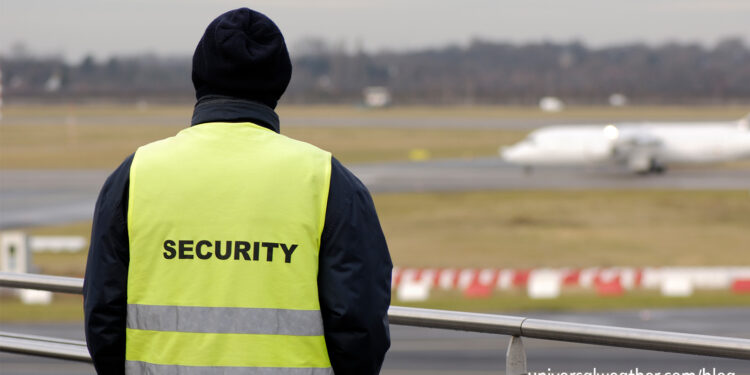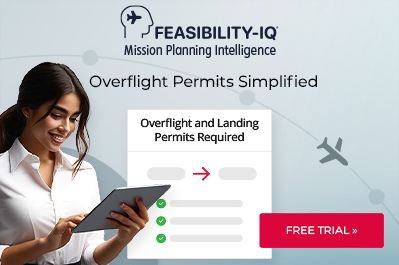Assessing Airport and Aircraft Security – Part 2: Aircraft Security Options

This business aviation blog post continues from our article last week, entitled “Assessing Airport and Aircraft Security – Part 1: Top Considerations.”
Always check with your trip support and/or security provider on current security/threat status at all planned destinations and tech stops. Ensure you have the latest information on what is and what is not permitted, in terms of aircraft security, for each destination. Understand costs, lead times and cancellation policies involved with setting up security at destination.
The following is an overview of what you need to know:
1. Aircraft guards ramp side
Be mindful of local airport authority regulations regarding permission to post aircraft guards airside. Regulations can change frequently, so it’s best to confirm what is and what is not permitted on each trip. In Morocco, for example, you may only use airside aircraft security services provided by the airport authorities. In India, airport authorities have become more stringent lately on who is permitted airside and what outside security services operators may use. Managua (MNMG) and Tunis (DTTA) do not permit 3rd-party aircraft security on the ramp under any circumstances. Puebla (MMPB) allows only UN-armed airport security and at least 24 hours’ notice is needed to make arrangements. In the Sao Paulo area, Congonhas (SBSP) does not permit 3rd-party aircraft security, but Guarulhos (SBGR) does. In China 90% of airports do not allow supplemental security on the ramp. You may, however, be able to work with airport authorities to have military staff, already on the airport, watch over your aircraft during your stay.
2. Hiring aircraft guards
Each airport has differing regulations in terms of aircraft guards. It’s best to have your trip support and security provider involved in setting up aircraft protection services, to ensure that personnel are stationed right at the aircraft and that there is no coverage gaps in securing the asset. As costs of these services vary greatly it’s recommended to obtain cost estimates for each location when these services are required.
3. Costs of aircraft security
There’s considerable fluctuation in the cost of aircraft security. This depends on the destination, availability of local security personnel, and any local events that may be taking place in the area-i.e., supply and demand. Particularly if you’re operating to a large event venue (e.g., Davos, G20 annual summit, large sporting events) you may be affected by higher security pricing due to increased demand. For short notice aircraft security requests, particularly when operating to large events, arrangements may be non-refundable and/or charges may apply for last minute cancellations. It’s always best to confirm with your security provider on what the cancellation policies are. In addition to hourly security personnel fees you may also be paying for their transport to/from the airport along with various charges imposed by the airport authority.
4. Cost/benefit of aircraft guards
Cost of an aircraft guards may range between 15 – 50 USD per hour, depending on the location. A good rule of thumb is to budget about 1000 USD per day for 24 hour continuous aircraft guard services. You’ll pay more, and should plan on longer lead times, when requesting armed personnel to guard your aircraft. While costs of putting dedicated guards on your aircraft may seem high, this could save you from more expensive options such as dropping passengers and repositioning to a different airport , or saving on the actual cost of repairs to an aircraft if it is damaged or tampered with while on the ground.
5. Vetting aircraft security guards
It’s important to properly vet any security personnel you hire. Ensure all personnel are properly licensed , are uniformed, and have updated training. For armed personnel confirm, in advance, that they have any required additional training as well as all licenses required by local authorities. Plan on at least 24 – 48 hours lead time when making aircraft security arrangements. The more lead time the better, particularly when dealing with large event locations where security services are in high demand. For the annual Davos World Economic Forum, for example, you’ll want to set up aircraft security services at least one month prior.
6. Working with aircraft security guards
When hiring aircraft security guards ensure that the personnel are in uniform, have appropriate IDs, and that the crew meets them personally on arrival. Your security contractor should be at the airport, waiting for the aircraft, at least 30 minutes prior to your arrival and stay until wheels up on your departure. Ensure that your ground handler and airport authorities are made aware of your security personnel. Security guards should keep an hourly log, and provide daily updated security reports on any incidents and/or people who come close to the aircraft. When crewmembers return to the aircraft, and especially if you’re planning on having a relief crew, ensure that they have their company crew IDs, as the security personnel should have instructions to not permit anyone onboard without appropriate identification.
7. Benefits of security investments
Third-party providers with security experience offer valuable insights into local security threats/issues and can recommend a range of effective risk mitigation steps for each intended international or domestic destinations. It’s recommended that you obtain advance security briefs – especially when operating to threat level 4 and 5 destinations. Be mindful that airport security briefs can be just as important as city and local area briefs. In the event you need to get back to your aircraft and depart quickly, you’ll have a better idea of risks and quick-exit options you may face.
Conclusion
Always speak with your security provider about risks and risk mitigation options prior to day of operation. Third-party providers with security expertise can provide you with a plan and steps to take to secure your aircraft, passengers and crew at destination. While it’s important to consider airport security risks at international destinations it’s also important to be mindful of the risks at domestic airports as well.
Questions?
If you have any questions about this article or would like assistance in planning security for your next trip, contact me at traciecarwile@univ-wea.com.




